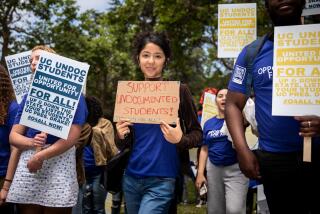Campuses May Bar Military Recruiters
- Share via
WASHINGTON — Handing a significant legal victory to gay-rights advocates, a federal appeals court ruled Monday that academic institutions may restrict on-campus recruiting by the military because of the Pentagon’s policy on gays and lesbians.
The 3rd U.S. Circuit Court of Appeals, based in Philadelphia, ruled that a federal law known as the Solomon Amendment infringes on the free-speech rights of schools by allowing the federal government to withhold funds from colleges and universities that deny access to military recruiters.
The preliminary injunction issued in one of four separate lawsuits filed by students and professors at law schools throughout the country found that by threatening to withhold federal funds from schools that do not accommodate military recruiters, the government was compelling them to take part in speech they did not agree with.
“The Solomon Amendment requires law schools to express a message that is incompatible with their educational objectives, and no compelling governmental interest has been shown to deny this freedom,” the panel wrote in a 2-1 decision.
The court overturned an opinion by a federal judge in New Jersey who ruled a year ago that law schools must open their doors to military recruiters, even if the Defense Department’s refusal to admit openly gay or lesbian individuals to military service offends a school’s antidiscrimination policies.
“The court understood that if bigots have a 1st Amendment right to exclude gays, then enlightened institutions have a 1st Amendment right to exclude bigots,” said E. Joshua Rosenkranz, lead counsel for the Forum for Academic and Institutional Rights, a coalition of more than 25 law schools -- including those at Stanford University, New York University and Georgetown University -- that filed suit against the Pentagon in September 2003.
The Pentagon can seek a review of the ruling from the entire 3rd Circuit or from the Supreme Court. Lawyers for the Pentagon did not return calls asking what their next step might be.
The controversy over military recruiting on law school campuses has simmered since the early 1990s, when schools began to extend their long-standing policies against campus recruitment by employers that discriminated on the basis of race and sex to those that did so on the basis of sexual orientation.
In 1994, Congress passed a defense authorization bill that included an amendment, sponsored by then-Rep. Gerald Solomon (R-N.Y.), allowing the government to withhold federal funds from institutions if they denied military recruiters access to students.
Faced with the possibility of losing hundreds of millions of dollars, almost all law schools backed down from their bans, allowing military recruiters on campus if invited by a student group or if they conducted interviews off campus.
But in December 2001, in the aftermath of the Sept. 11 terrorist attacks, the Defense Department added new teeth to the Solomon Amendment, establishing regulations that subjected entire academic institutions, rather than just their law schools, to the loss of federal dollars.
A year later, it began enforcing the new regulations in earnest, notifying schools that they were out of compliance with the law and faced a loss of funds if they did not provide military recruiters the same level of access to their students as that given to recruiters from the private sector.
The modern military relies heavily on lawyers, who form the Judge Advocate General’s Corps and help commanders establish the legal basis for many of their decisions.
Some law school officials say they believe that the war in Iraq and the government’s concerns about terrorism are driving its campaign for greater access to potential recruits. The Defense Department contends that it is just following the law.
More to Read
Sign up for Essential California
The most important California stories and recommendations in your inbox every morning.
You may occasionally receive promotional content from the Los Angeles Times.










